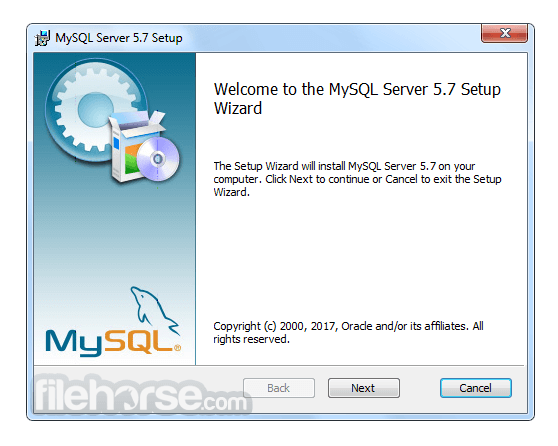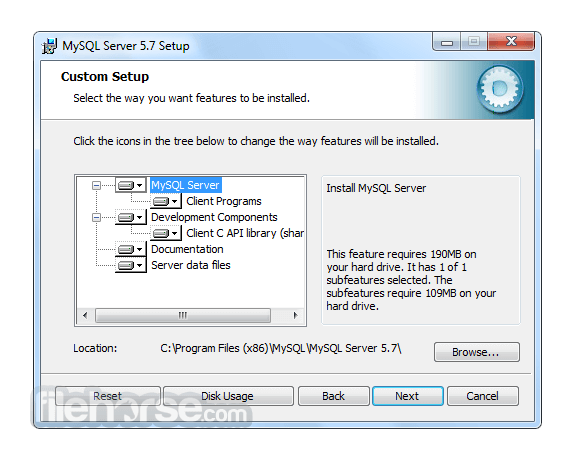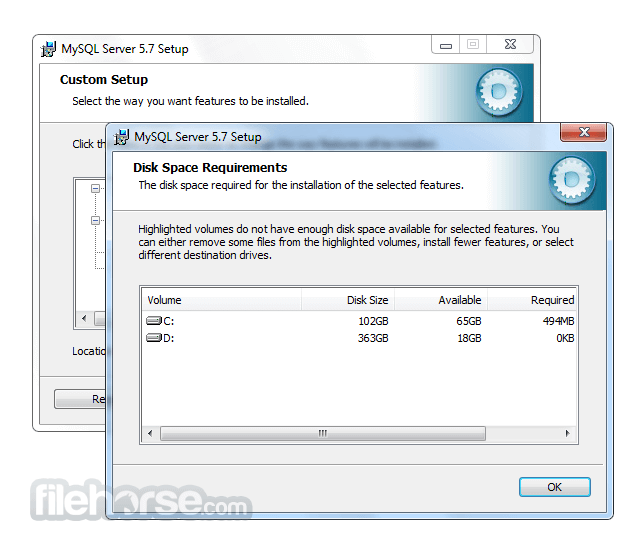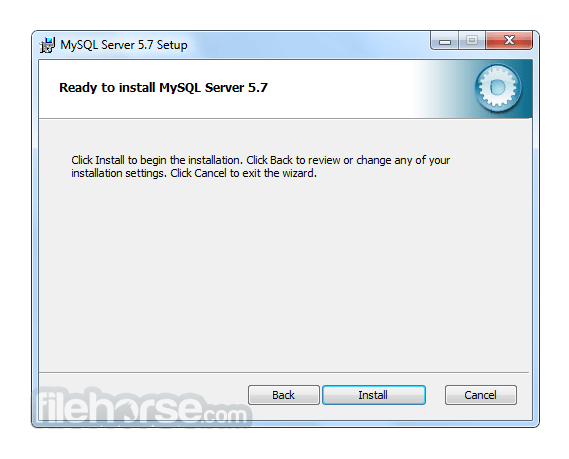-
Latest Version
-
Operating System
Windows XP / Vista / Windows 7 / Windows 8
-
User Rating
Click to vote -
Author / Product
-
Filename
mysql-5.6.25-win32.msi
-
MD5 Checksum
145bac3e1a369e086a033868c26a4cce
Sometimes latest versions of the software can cause issues when installed on older devices or devices running an older version of the operating system.
Software makers usually fix these issues but it can take them some time. What you can do in the meantime is to download and install an older version of MySQL 5.6.25 (32-bit).
For those interested in downloading the most recent release of MySQL or reading our review, simply click here.
All old versions distributed on our website are completely virus-free and available for download at no cost.
We would love to hear from you
If you have any questions or ideas that you want to share with us - head over to our Contact page and let us know. We value your feedback!
What's new in this version:
Functionality Added or Changed:
- MySQL Enterprise Firewall operates on parser states and does not work well together with the query cache, which circumvents the parser. MySQL Enterprise Firewall now checks whether the query cache is enabled. If so, it displays a message that the query cache must be disabled and does not load. (Bug #20913616)
- my_print_defaults now masks passwords. To display passwords in cleartext, use the new --show option. (Bug #19953365)
- MySQL distributions now include an innodb_stress suite of test cases.
Bugs Fixed:
- InnoDB; Partitioning: The CREATE_TIME column of the INFORMATION_SCHEMA.TABLES table now shows the correct table creation time for partitioned InnoDB tables. The CREATE_TIME column of the INFORMATION_SCHEMA.PARTITIONS table now shows the correct partition creation time for a partition of partitioned InnoDB tables.
- The UPDATE_TIME column of the INFORMATION_SCHEMA.TABLES table now shows when a partitioned InnoDB table was last updated by an INSERT, DELETE, or UPDATE. The UPDATE_TIME column of the INFORMATION_SCHEMA.PARTITIONS table now shows when a partition of a partitioned InnoDB table was last updated. (Bug #69990, Bug #17299181)
- InnoDB: An assertion was raised on shutdown due to XA PREPARE transactions holding explicit locks. (Bug #20816223)
- InnoDB: The strict_* forms of innodb_checksum_algorithm settings (strict_none, strict_innodb, and strict_crc32) caused the server to halt when a non-matching checksum was encountered, even though the non-matching checksum was valid. For example, with innodb_checksum_algorithm=strict_crc32, encountering a valid innodb checksum caused the server to halt. Instead of halting the server, a message is now printed to the error log and the page is accepted as valid if it matches an innodb, crc32 or none checksum. (Bug #20568464)
- InnoDB: The memcached set command permitted a negative expire time value. Expire time is stored internally as an unsigned integer. A negative value would be converted to a large number and accepted. The maximum expire time value is now restricted to INT_MAX32 to prevent negative expire time values. (Bug #20478242, Bug #75790)
- InnoDB: Removal of a foreign key object from the data dictionary cache during error handling caused the server to exit. (Bug #20442523)
- InnoDB: SHOW ENGINE INNODB STATUS output showed negative reservation and signal count values due to a counter overflow error. (Bug #20417397)
- InnoDB: Failure to check the status of a cursor transaction read-only option before reusing the cursor transaction for a write operation resulted in a server exit during a memcached workload. (Bug #20391552)
- InnoDB: MDL locks taken by memcached clients caused a MySQL Enterprise Backup FLUSH TABLES WITH READ LOCK operation to hang. (Bug #20275612)
- InnoDB: Estimates that were too low for the size of merge chunks in the result sorting algorithm caused a server exit. (Bug #20049521)
- InnoDB: For full-text searches, the optimizer could choose an index that does not produce correct relevancy rankings. (Bug #74686, Bug #19950568)
- Partitioning: When creating a partitioned table, partition-level DATA DIRECTORY or INDEX DIRECTORY option values that contained an excessive number of characters were handled incorrectly. (Bug #20809045)
- Partitioning: Executing an ALTER TABLE on a partitioned table on which a write lock was in effect could cause subsequent SQL statements on this table to fail. (Bug #74288, Bug #74634, Bug #19784790, Bug #19918805)
- Replication: When binary logging was enabled, using stored functions and triggers resulting in a long running procedure that inserted many records caused the memory use to increase rapidly. This was due to memory being allocated per variable. The fix ensures that in such a situation, memory is allocated once and the same memory is reused. (Bug #75879, Bug #20531812)
- Replication: If an error was encountered while adding a GTID to the received GTID set, the log lock was not being correctly released. This could cause a deadlock. (Bug #75781, Bug #20492319)
- Replication: A slave running MySQL 5.6.24 or earlier could not connect to a master running MySQL 5.7.6 and later that had gtid_mode=OFF_PERMISSIVE or gtid_mode=ON_PERMISSIVE. The fix ensures that a slave running MySQL 5.6.25 and later can connect to such a master as long as the slave's gtid_mode is compatible. In other words, a slave running MySQL 5.6.25 and later which has gtid_mode=OFF can connect to a master running MySQL 5.7.6 and later which has gtid_mode=OFF_PERMISSIVE, and a slave running MySQL 5.6.25 and later which has gtid_mode=ON can connect to a master running MySQL 5.7.6 and later which has gtid_mode=ON_PERMISSIVE. Other combinations are incompatible. (Bug #75769, Bug #20471216)
- Replication: If an error occurred when using a multi-threaded slave, issuing a CHANGE MASTER TO statement which resulted in an ER_MTS_CHANGE_MASTER_CANT_RUN_WITH_GAPS error, and then issuing RESET SLAVE, made it impossible to change master due to repeated ER_MTS_CHANGE_MASTER_CANT_RUN_WITH_GAPS errors. Running the debug version of mysqld caused an unexpected exit in this case. The fix ensures that the recovery process for multi-threaded slaves avoids this. (Bug #75574, Bug #20411374)
- Replication: When using semisynchronous replication performance was degrading when the number of threads increased beyond a certain threshold. To improve performance, now only the thread which is committing is responsible for deleting the active transaction node. All other operations do not touch this active transaction list. (Bug #75570, Bug #20574628)
- Replication: Using mysqlbinlog to process log events greater than 1.6GB failed with an out of memory error. This was caused by an internal error converting the length variable. The fix upgrades the length variable to avoid overflow in both encoding and decoding functions. (Bug #74734, Bug #20350989)
- Replication: When master_info_repository=TABLE the receiver thread stores received event information in a table. The memory used in the process of updating the table was not being freed correctly and this could lead to an out of memory error. The fix ensures that after an event is flushed to the relay log file by a receiver thread, the memory used is freed. (Bug #72885, Bug #19390463, Bug #69848, Bug #20124342)
Replication: Using mysqlbinlog to replay a relay log which ended with GTID_LOG_EVENT could cause the following error:
- ERROR 1790 (HY000) @@SESSION.GTID_NEXT cannot be changed by a client that owns a GTID. The client owns UUID:GTID. Ownership is released on COMMIT or ROLLBACK.
- If a relay log rotate happens (either through a receiver thread restart or after issuing the ROTATE command) exactly after writing a GTID_LOG_EVENT, when replaying such a relay log's end ROTATE_EVENT, it was mistakenly identified as being inside a transaction, whereas the transaction was actually started after GTID_LOG_EVENT. This caused mysqlbinlog to append SET @@SESSION.GTID_NEXT='AUTOMATIC', resulting in two GTID_NEXT statements one after the other. The fix ensures that mysqlbinlog generates SET @@SESSION.GTID_NEXT='AUTOMATIC' only outside of a transaction and when there has not been a previous GTID_LOG_EVENT.
- Similarly, using mysqlbinlog to concatenate and replay a relay log which contained a partial GTID transaction caused the above error. A relay log can contain a partial GTID transaction when AUTO_POSITION is enabled if a receiver thread is restarted when it is in the middle of transferring a transaction from a master. On restart the slave retrieves the full transaction again. In this case, the first relay log contains a partial GTID transaction and the second relay log contains the full GTID transaction again. When using mysqlbinlog to concatenate such a relay log, the partial transaction was not being correctly detected and therefore a ROLLBACK was not being correctly generated. The fix identifies partial GTID transactions using the format description event of the second relay log, ensuring that a ROLLBACK is correctly added. (Bug #70711, Bug #17650326)
- For small values of the read_rnd_buffer_size system variable, internal caching of temporary results could fail and cause query execution failure. (Bug #20895852)
- The normalize_statement() UDF used by MySQL Enterprise Firewall could cause a server exit for certain password-related statements. (Bug #20873209)
- A failed FLUSH PRIVILEGES statement followed by statements to create or drop accounts could cause a server exit. (Bug #20857652)
- std::stringstream code used by MySQL Enterprise Firewall could cause a server exit. (Bug #20848536)
- SHOW VARIABLES mutexes were being locked twice, resulting in a server exit. (Bug #20788853)
- ull2dec() was modified to avoid a problem with GCC 5 in optimized mode. (Bug #20768820)
- Using GCC 5, debug builds failed due to compiler warnings. (Bug #20768717)
- A Provides rule in RPM .spec files misspelled “mysql-embedded” as “mysql-emdedded”. (Bug #20734434)
- The mysql_firewall_max_query_size system variable should be read only at runtime, but it was possible to modify it. (Bug #20608993)
- MySQL Enterprise Firewall could leak memory in the unlikely event of failure to store information in an INFORMATION_SCHEMA table. (Bug #20593257)
- Using a MySQL 5.6 version of mysqladmin to change the password for an account on a MySQL 5.7.6 installation resulted in an unusable account password. (Bug #20590548)
- AddressSanitizer compilation errors were silenced. (Bug #20459338, Bug #75740, Bug #20459363)
- Under certain conditions, the libedit command-line library could write outside an array boundary and cause a client program crash. (Bug #20318154)
- mysql_config_editor could exit abnormally while encrypting passwords. (Bug #20294225)
- Host value matching for the grant tables could fail to use the most specific of values that contained wildcard characters. (Bug #20181776)
- For MySQL distributions linked against yaSSL, a corrupt client key file could cause clients to exit. (Bug #20168526)
- For join queries with a large number of tables, the server could exit converting the join to a semi-join. (Bug #20109861)
- Deleting rows from mysql.user following by granting privileges to a new account could result in a server exit. (Bug #20031475)
- Renaming the mysql.procs_priv table and executing SHOW GRANTS resulted in a server exit. (Bug #20006361)
- Within a stored procedure, access to view columns after DDL or FLUSH TABLES statements in the procedure could cause a server exit. (Bug #19897405)
- Execution of certain BINLOG statements while temporary tables were open by HANDLER statements could cause a server exit. (Bug #19894987)
- For a prepared statement with an ORDER BY that refers by column number to a GROUP_CONCAT() expression that has an outer reference, repeated statement execution could cause a server exit. (Bug #19814337)
- CMake configuration was adjusted to handle new warnings reported by Clang 3.5, using the -Wpointer-bool-conversion and -Wundefined-bool-conversion compiler options. (Bug #19584183)
- Loading corrupt spatial data into a MyISAM table could cause the server to exit during index building. (Bug #19573096)
- Specifying --general_log_file= (with an empty value) at server startup caused the server to fail and exit. (Bug #19392264)
- CMake configuration was adjusted to handle warnings reported by Clang 3.3. (Bug #17486216)
- Some MySQL Enterprise Firewall diagnostic messages were written outside the control of the log_error_verbosity system variable. (Bug #76612, Bug #20848331)
- The server rejected empty COM_SHUTDOWN packets. (Bug #76552, Bug #20810928)
- References: This bug was introduced by Bug #14525642.
- Inappropriate -Werror options could appear in mysql_config --cflags output. (Bug #76019, Bug #20590904)
- In the Performance Schema threads table, the PROCESSLIST_STATE and PROCESSLIST_INFO values did not change for the thread/sql/main main thread instrument as the thread state changed. (Bug #74517, Bug #19887143)
- Certain queries for the INFORMATION_SCHEMA TABLES and COLUMNS tables could lead to excessive memory use when there were large numbers of empty InnoDB tables. (Bug #72322, Bug #18592390)
- Queries that included a HAVING clause based on nondeterministic functions could produce incorrect results. (Bug #69638, Bug #17055185)
- For logging of prepared statements to the general query log, the Execute line was logged after statement execution, not before. (Bug #69453, Bug #16953758, Bug #20536590)
- MySQL failed to compile using OpenSSL 0.9.8e. (Bug #68999, Bug #16861371)
 OperaOpera 117.0 Build 5408.197 (64-bit)
OperaOpera 117.0 Build 5408.197 (64-bit) PC RepairPC Repair Tool 2025
PC RepairPC Repair Tool 2025 PhotoshopAdobe Photoshop CC 2025 26.5.0 (64-bit)
PhotoshopAdobe Photoshop CC 2025 26.5.0 (64-bit) OKXOKX - Buy Bitcoin or Ethereum
OKXOKX - Buy Bitcoin or Ethereum iTop VPNiTop VPN 6.3.0 - Fast, Safe & Secure
iTop VPNiTop VPN 6.3.0 - Fast, Safe & Secure Premiere ProAdobe Premiere Pro CC 2025 25.2.1
Premiere ProAdobe Premiere Pro CC 2025 25.2.1 BlueStacksBlueStacks 10.42.50.1004
BlueStacksBlueStacks 10.42.50.1004 Hero WarsHero Wars - Online Action Game
Hero WarsHero Wars - Online Action Game SemrushSemrush - Keyword Research Tool
SemrushSemrush - Keyword Research Tool LockWiperiMyFone LockWiper (Android) 5.7.2
LockWiperiMyFone LockWiper (Android) 5.7.2










Comments and User Reviews